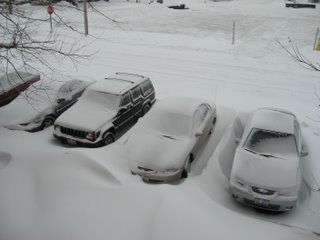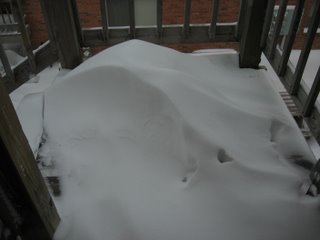This cover of Springsteen's "Thunder Road" is frickin' amazing. Check that link while you can, its all kinds of illegal, but I just had to share it with y'all.
I happened to hear the song on WBER, my favorite radio station ever in all of history. It's a little community college station out of Rochester, New York that you used to be able to tune in where I grew up if you tilted the antenna just so. When I went off to college in Binghamton, New York I moved out of range of my beloved BER. My friend and sometime roomate (ever hear about those nightmare college roomies, yeah, that was um, me actually) Scott hailed from Rochester and shared my love of the station and missed it just as I did. We used to plot weird schemes to loft high-gain antennas on surplus weather balloons and pick it up that way as a way to pass the time in freshman physics. The balloons never got off the ground, but now I can pick up WBER's high-bandwidth stream on my wireless laptop as long as I have internet connectivity. Brave new world. The sound is slightly better than it used to be on the tilted just so FM receiver back home.
In other news, this cover renders "Thunder Road" eminently a cappella singable, much to the chagrin of my neighbors. :)
Thursday, February 15, 2007
Wednesday, February 14, 2007
Level 3 Snow Emergency! Oh Noes!
We had some snow. And some wind. Snow + Wind looks like this:

This is the windward side of my building.

And this is the leeward side. Some may recognize my gold Taurus in the middle there. I got the wrong parking spot, I guess.

I found this outside my door. After I cleared the snow out of the door jamb.

This is the windward side of my building.

And this is the leeward side. Some may recognize my gold Taurus in the middle there. I got the wrong parking spot, I guess.

I found this outside my door. After I cleared the snow out of the door jamb.
Monday, February 05, 2007
Thursday, February 01, 2007
Notes on A Lost Country
I was in the media library of the Ethnic Studies department where I teach when I noticed on the shelf a book that had been important to me as a young adult, but that I had recently all but forgotten - Whitley Strieber and James Kunetka's War Day.
I picked it up and re-read it, of course, finding something else to read just like I always do when I should be doing my reading for courses or teaching.
Reading it again was surreal on two levels. First, the book itself is written in a faux-journalist style. The authors write from the point of view of themselves on a road trip through a post-nuclear-war America in what would be their future (the book was written in 1983, the characters within it write from the point of view of 1992, discussing the events leading up to and resulting from a nuclear war in 1988) and includes various chapters made up in the format of interviews of people living in post war America, as well as government documents describing such elements of the war's aftermath as nuclear fall-out patterns. As a whole, I found the style fairly convincing, the whole thing really does read like some kind of document dropped, a la Borges, into our reality from some alternate historical time-line. A monograph of a time that never was - but, with the nuclear sword of Damocles hanging over our heads for half a century, was still very real in our collective unconscious. It certainly was in mine.
It was that personal connection that made re-reading the book doubly strange. Nuclear war hung heavy in my mind as a young man, both as a terror and a hope. My utter repulsion at the notion of having to grow up, get a job, become a productive member of society doing as I was told was such that the bomb seemed a tantalizing alternative - that the boring world I was doomed to grow up and into might be washed away in a sudden flash of nuclear fire, replaced by a existence at once simpler and more romantic. A world where derelict buildings and vehicles could be claimed at will, where (my naive young self imagined) a sort of techno-pastoralism would reign - high tech ruins and happy farmers.
Even then, I knew this was unrealistic, but the image was still a powerful one. It is not, I realize upon my re-reading of Warday, the image Warday gives of post-war existence (which it painstakingly renders the hardships of) but the images of Warday shaped my vision of postwar existence. It contains a scene set in a partially bombed New York (in the novel, the set of bombs meant for New York misses and strikes Queens and Brooklyn) that I realized I had lifted for the first short story I had ever written (which imagined three friends living a post-apocalyptic pastoral existence setting out to see the ruins of New York). That story would morph into a story I would tell to an ex-girlfriend in the middle of the night when she would turn to me, half asleep and ask me to tell her a story (as one gets asked when one identifies oneself as a fiction writer). The night-time story (about friends living a pastoral existence raising vegetables in the ruins of a wasted New York) would be included in, ironically enough, the last story I ever wrote.
Like the image of ruined New York many other things in the novel, I realized, were landmarks in my memory. Great prominent image features, always at least dimly visible in my mind.
Visible, but transformed since I first knew them. The book was, for me, an artifact from another lost country, that of my own childhood. Strange and a little sad to stumble upon.
I was wistful about that for a day or so, the loss of childhood, of certain ideas about the world and myself, of the girl I used to tell that story to. But then something else happened. Something very mundane, really. I was out late at night, returning a video, all bundeled up against the cold, with my high-tech ipod playing the new Shins album in my ear, and the snow was powdery and sparkling and bright...
and it just struck me: It's a good thing the bombs never fell.
I have a job I take some satisfaction in, I have my little apartment, my recipes, my friends, my library, all privileges to be sure, but
It's a good thing the bombs never fell.
Now let's just hope we get past this peak oil thing without burning the place down.
I picked it up and re-read it, of course, finding something else to read just like I always do when I should be doing my reading for courses or teaching.
Reading it again was surreal on two levels. First, the book itself is written in a faux-journalist style. The authors write from the point of view of themselves on a road trip through a post-nuclear-war America in what would be their future (the book was written in 1983, the characters within it write from the point of view of 1992, discussing the events leading up to and resulting from a nuclear war in 1988) and includes various chapters made up in the format of interviews of people living in post war America, as well as government documents describing such elements of the war's aftermath as nuclear fall-out patterns. As a whole, I found the style fairly convincing, the whole thing really does read like some kind of document dropped, a la Borges, into our reality from some alternate historical time-line. A monograph of a time that never was - but, with the nuclear sword of Damocles hanging over our heads for half a century, was still very real in our collective unconscious. It certainly was in mine.
It was that personal connection that made re-reading the book doubly strange. Nuclear war hung heavy in my mind as a young man, both as a terror and a hope. My utter repulsion at the notion of having to grow up, get a job, become a productive member of society doing as I was told was such that the bomb seemed a tantalizing alternative - that the boring world I was doomed to grow up and into might be washed away in a sudden flash of nuclear fire, replaced by a existence at once simpler and more romantic. A world where derelict buildings and vehicles could be claimed at will, where (my naive young self imagined) a sort of techno-pastoralism would reign - high tech ruins and happy farmers.
Even then, I knew this was unrealistic, but the image was still a powerful one. It is not, I realize upon my re-reading of Warday, the image Warday gives of post-war existence (which it painstakingly renders the hardships of) but the images of Warday shaped my vision of postwar existence. It contains a scene set in a partially bombed New York (in the novel, the set of bombs meant for New York misses and strikes Queens and Brooklyn) that I realized I had lifted for the first short story I had ever written (which imagined three friends living a post-apocalyptic pastoral existence setting out to see the ruins of New York). That story would morph into a story I would tell to an ex-girlfriend in the middle of the night when she would turn to me, half asleep and ask me to tell her a story (as one gets asked when one identifies oneself as a fiction writer). The night-time story (about friends living a pastoral existence raising vegetables in the ruins of a wasted New York) would be included in, ironically enough, the last story I ever wrote.
Like the image of ruined New York many other things in the novel, I realized, were landmarks in my memory. Great prominent image features, always at least dimly visible in my mind.
Visible, but transformed since I first knew them. The book was, for me, an artifact from another lost country, that of my own childhood. Strange and a little sad to stumble upon.
I was wistful about that for a day or so, the loss of childhood, of certain ideas about the world and myself, of the girl I used to tell that story to. But then something else happened. Something very mundane, really. I was out late at night, returning a video, all bundeled up against the cold, with my high-tech ipod playing the new Shins album in my ear, and the snow was powdery and sparkling and bright...
and it just struck me: It's a good thing the bombs never fell.
I have a job I take some satisfaction in, I have my little apartment, my recipes, my friends, my library, all privileges to be sure, but
It's a good thing the bombs never fell.
Now let's just hope we get past this peak oil thing without burning the place down.
Subscribe to:
Posts (Atom)



